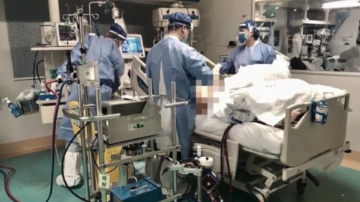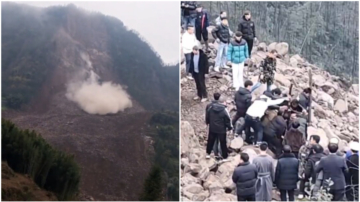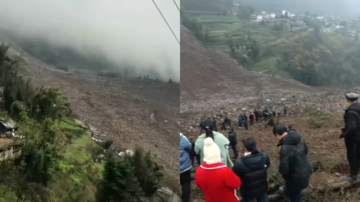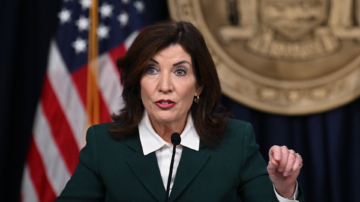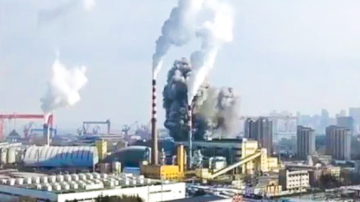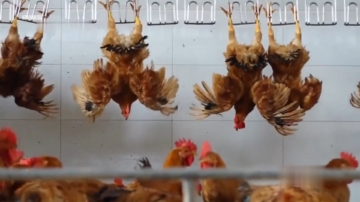【新唐人2015年01月08日訊】去年的最後一天,上海外灘發生了踩踏事故,造成至少36人死亡,49人受傷。1月6號,是事故遇難者的「頭七」,但上海當局卻無情的維穩,同時極力阻止家屬向媒體申訴。有批評說,「上海踩踏」後出現的種種「人權踩踏」,使得人們無法樂觀以待。
6號早上,上海當局在上海外灘陳毅廣場架起了鐵欄,把整個廣場包括事發地點南側臺階隔開,並調動上百警察在場戒備,嚴禁一般市民進入,而遇難者家屬也要在民警的引導下,才能進場。
警方要求每個遇難者家庭分批進場悼念,而且只給每個家庭5分鐘時間獻花祭拜,時間一到,工作人員就會立即把他們帶走。一些家屬嚎啕大哭,癱軟在地,也有家屬崩潰暈倒,被幾名醫護人員用擔架抬上救護車。
與此同時,上海當局將外國和香港傳媒隔絕在廣場遠處的一個小區域,以防止家屬走近申訴。有家屬向遠處的記者呼叫,但她很快被警方帶走。
上海踩踏事件死者妻子范萍:「我現在最大就是希望,政府能夠給我一個說法,為甚麼我老公進去的時候人是有生命跡象的,等到24小時以後,我們在殯儀館見到我老公,在醫院中是沒有任何一個人說,我們病人在裡面是一個甚麼樣的情況。」
一名來自四川成都的男子向《法國國際廣播電臺》表示,當局對死難者家屬進行嚴格監控。他說:「我們被安排住在不同的地點,我們每到哪裡,都有3個人跟著。」
上海獨立評論員趙楚(Zhao Chu)向《美聯社》指出,這樣一個大型公共安全事故可以拉扯民眾的心弦,受害者家屬的言行可令民眾情緒搖擺,使得當局把控制家屬、限制他們彼此接觸或接觸媒體當作首要任務。
自由撰稿人朱欣欣:「在目前這種維穩體制下,官方把任何事情的發生,首先考慮的不是民眾的感受,民眾的意見,首先考慮到是對他們政權穩固性、合法性的影響,所以首先是對不同的意見要嚴密封鎖,唯恐引發民意的不滿,成為整個社會矛盾爆發的一個導火索。」
據英國《金融時報》報導,多數媒體被允許報導事件經過,但是,它們不能推測踩踏事件的原因,也不能發表家屬抱怨的報導﹔這些抱怨的對象包括:官方未能防止踩踏事件,急救服務反應遲緩,以及家屬到醫院探訪遇難者受阻等。
《法廣》報導指出,「上海踩踏」後出現了種種的「人權踩踏」,上海當局在預防踩踏事故上不僅無能且不負責,但在封鎖消息上卻純熟老道。
朱欣欣:「中共現在十分的恐懼,它就感覺到周圍到處都是導火索,等待某一個突發事件的點燃,所以它這種處理的做法,我們可以理解,是完全一種不自信,這恰恰說明目前中共這種虛弱的狀態。」
大陸《維權網》6號報導,因懷疑民間有人在調查上海踩踏事件實際死亡人數,陳健芳、邱蓓、汪建華等多位上海維權人士遭到警方訊問、失聯或被軟禁。
上海維權人士陳健芳家人:「他們過來看一看,家裡來看一下,是說不讓他出去嘛,大致情況我也不大清楚,他們就說甚麼31號踩死人了,他們要去慰問,悼念甚麼的。我們那裡信號基本上沒有,打不通的。」
據上海殯葬管理規定,所有遇難者遺體要在上海火化。有家屬透露,政府向他們施壓,要求盡早將遺體火化或出殯,但家屬擔心,一旦把遺體火化,日後就死無對證,難以追討。
上海市民談藍英:「這次外灘事件非常痛心,現在都生一個孩子,獨生子女,人家一個孩子失去了,那是甚麼心情,他們比禽獸都不如啊,共產黨就是流氓、土匪、強盜。」
據香港《蘋果日報》報導,上海當地報章6號在頭版都刊登了市領導集體為踩踏事故默哀的文章,上海市長楊雄更指要「深刻反思」,但事發7天,慘劇的起因仍未查出,「頭七」當天,也沒有官員前往陳毅廣場致哀。有大陸記者引述一名官員的消息稱,上海官場要求口徑一致,對踩踏慘劇稱為「事件」而不能叫做「事故」,並且要強調是「民眾自發前往擁擠導致」。
採訪/陳漢 編輯/陳潔 後製/舒燦
"Crush over Human Rights" Follows
"Crush over Humans" in Shanghai.
On the last day of 2014, a stampede accident took place in
Shanghai, resulting in at least 36 deaths and 49 injured.
Jan.6 was the "First Seven Day" for victims of the accident.
However, people only saw the Chinese Communist Party
(CCP) local government's merciless "stability maintenance".
Families of victims were also prevented from getting in
touch with the media.
There are criticisms saying, crush over humans in
Shanghai was followed by crush over human rights.
This makes it hard for Chinese people to be
optimistic about the situation.
On the morning of Jan.6, metal barriers were set up around
Chen Yi Square at the Bund.
The barriers insulated the south side of the square where
the stampede accident occurred.
Hundreds of police guarded the square, strictly forbidding
civilians to enter the site.
Only families of victims were allowed to enter
under police guidance.
Police required families of each victim
to enter the site separately.
Each family was only given 5 minutes to mourn
and place flowers.
They were ordered to leave by officers immediately after
the given time was over.
There were family members of victims crying so hard
that they fainted on the ground.
These people were stretchered to an ambulance by medics.
In the meantime, the CCP also gathered all foreign and
Hong Kong journalists in a small area away from the square.
The move was to prevent any victim families from making
appeals to the media.
There was a family member calling journalists in the distance,
but she was soon forcibly taken away by police.
Fan Ping, wife of Shanghai Stampede Accident, "My principal
hope is that the government needs to give me an explanation.
My husband was still alive when being taken to the hospital.
But after 24 hours, we only saw his body in the mortuary.
Nobody in the hospital explained to us what happened
to my husband during those 24 hours."
A man from Chengdu, Sichuan Province told RFI that, victim
families are currently under strict surveillance by the CCP.
He said, "We live at different locations by arrangement,
and 3 people follow us wherever we go."
Zhao Chu, a Shanghai independent commentator, told AP
that, victims' families talking about such a serious accident
could easily affect public sentiment.
"So, the CCP is making it a primary task to prevent victim
families from contacting each other or receiving any media
interview", said Zhao.
Zhu Xinxin, freelancer, "When anything takes place, the CCP
current 'stability maintenance' system never takes peoples'
feelings or opinions as the first thing to be considered.
Instead, they always worry first about stability of the regime,
or legitimacy of the party's governance.
As a result, the immediate thing they do is block all different
voices, as the CCP is extremely afraid of any public resentment
that may light the fuse of social conflicts all over the state."
An FT report said, the CCP allowed most media to report the
accident.
However it forbade them to speculate about the cause of
the stampede, or any complaints from victim families.
Examples of "complaining comments" are the CCP's failure
to prevent the accident, the slow response of emergency
services and the fact that families were blocked from
visiting victims in hospital.
RFI commented that, "crush over human rights" followed
"crush over human" in Shanghai.
The CCP showed how incapable and irresponsible they were
in preventing the stampede.
But by contrast, showed how skilled they were in blocking
information after the accident.
Zhu Xinxin, "The CCP is extremely frightened now.
They feel like any incident may become the fuse of
social conflicts.
So the way the CCP is coping with the stampede can be read
as a signal of being insecure.
This exactly shows how weak the CCP's ruling is."
Chinese Human Rights Defenders website (weiquanwang.org)
reported on Jan.6 that, Chen Jianfang, Qiu Pei, Wang Jianhua
and many rights activists were interrogated, abducted or
monitored by police when investigating the true death toll.
A family member of rights activist Chen Jianfang, "They
(the police) visited our home, saying he should not go out.
I know little about the details.
The police said people died in a crush on Dec.31 and they
planned to mourn the dead.
Currently there is little phone signal at our home
and you cannot call him."
According to regulations by Shanghai Funeral Administration,
all victims have to be cremated in Shanghai.
There are victim families revealing that the CCP was urging
them to cremate bodies as soon as possible.
However, victim families worry that there will be no
evidence left to appeal if they do that.
Tan Lanying, Shanghai resident, "The accident at the Bund
is very distressing.
Under the single-child policy, you can imagine how parents
feel after losing their only child.
The CCP is worse than a beast. They are nothing more
than villains, bandits and gangsters."
Apple Daily said, Shanghai newspaper published articles on
Jan.6 about mourning actions of the city's CCP leader groups.
Mayor Yang Xiong also said "they need to look inward".
However, the cause of the accident is still "unknown"
7 days after the stampede.
On the "First Seven Day", not one CCP official went to
Chen Yi Square for mourning.
A mainland journalist quoted one CCP official, who revealed
that all Shanghai officials were required to say the same.
That is, calling the stampede tragedy "an incident" instead
of "an accident"; and
"The incident resulted from spontaneous
pushing and squeezing of the crowds".
Interview/ChenHan Edit/ChenJie Post-Production/ShuCan
6號早上,上海當局在上海外灘陳毅廣場架起了鐵欄,把整個廣場包括事發地點南側臺階隔開,並調動上百警察在場戒備,嚴禁一般市民進入,而遇難者家屬也要在民警的引導下,才能進場。
警方要求每個遇難者家庭分批進場悼念,而且只給每個家庭5分鐘時間獻花祭拜,時間一到,工作人員就會立即把他們帶走。一些家屬嚎啕大哭,癱軟在地,也有家屬崩潰暈倒,被幾名醫護人員用擔架抬上救護車。
與此同時,上海當局將外國和香港傳媒隔絕在廣場遠處的一個小區域,以防止家屬走近申訴。有家屬向遠處的記者呼叫,但她很快被警方帶走。
上海踩踏事件死者妻子范萍:「我現在最大就是希望,政府能夠給我一個說法,為甚麼我老公進去的時候人是有生命跡象的,等到24小時以後,我們在殯儀館見到我老公,在醫院中是沒有任何一個人說,我們病人在裡面是一個甚麼樣的情況。」
一名來自四川成都的男子向《法國國際廣播電臺》表示,當局對死難者家屬進行嚴格監控。他說:「我們被安排住在不同的地點,我們每到哪裡,都有3個人跟著。」
上海獨立評論員趙楚(Zhao Chu)向《美聯社》指出,這樣一個大型公共安全事故可以拉扯民眾的心弦,受害者家屬的言行可令民眾情緒搖擺,使得當局把控制家屬、限制他們彼此接觸或接觸媒體當作首要任務。
自由撰稿人朱欣欣:「在目前這種維穩體制下,官方把任何事情的發生,首先考慮的不是民眾的感受,民眾的意見,首先考慮到是對他們政權穩固性、合法性的影響,所以首先是對不同的意見要嚴密封鎖,唯恐引發民意的不滿,成為整個社會矛盾爆發的一個導火索。」
據英國《金融時報》報導,多數媒體被允許報導事件經過,但是,它們不能推測踩踏事件的原因,也不能發表家屬抱怨的報導﹔這些抱怨的對象包括:官方未能防止踩踏事件,急救服務反應遲緩,以及家屬到醫院探訪遇難者受阻等。
《法廣》報導指出,「上海踩踏」後出現了種種的「人權踩踏」,上海當局在預防踩踏事故上不僅無能且不負責,但在封鎖消息上卻純熟老道。
朱欣欣:「中共現在十分的恐懼,它就感覺到周圍到處都是導火索,等待某一個突發事件的點燃,所以它這種處理的做法,我們可以理解,是完全一種不自信,這恰恰說明目前中共這種虛弱的狀態。」
大陸《維權網》6號報導,因懷疑民間有人在調查上海踩踏事件實際死亡人數,陳健芳、邱蓓、汪建華等多位上海維權人士遭到警方訊問、失聯或被軟禁。
上海維權人士陳健芳家人:「他們過來看一看,家裡來看一下,是說不讓他出去嘛,大致情況我也不大清楚,他們就說甚麼31號踩死人了,他們要去慰問,悼念甚麼的。我們那裡信號基本上沒有,打不通的。」
據上海殯葬管理規定,所有遇難者遺體要在上海火化。有家屬透露,政府向他們施壓,要求盡早將遺體火化或出殯,但家屬擔心,一旦把遺體火化,日後就死無對證,難以追討。
上海市民談藍英:「這次外灘事件非常痛心,現在都生一個孩子,獨生子女,人家一個孩子失去了,那是甚麼心情,他們比禽獸都不如啊,共產黨就是流氓、土匪、強盜。」
據香港《蘋果日報》報導,上海當地報章6號在頭版都刊登了市領導集體為踩踏事故默哀的文章,上海市長楊雄更指要「深刻反思」,但事發7天,慘劇的起因仍未查出,「頭七」當天,也沒有官員前往陳毅廣場致哀。有大陸記者引述一名官員的消息稱,上海官場要求口徑一致,對踩踏慘劇稱為「事件」而不能叫做「事故」,並且要強調是「民眾自發前往擁擠導致」。
採訪/陳漢 編輯/陳潔 後製/舒燦
"Crush over Human Rights" Follows
"Crush over Humans" in Shanghai.
On the last day of 2014, a stampede accident took place in
Shanghai, resulting in at least 36 deaths and 49 injured.
Jan.6 was the "First Seven Day" for victims of the accident.
However, people only saw the Chinese Communist Party
(CCP) local government's merciless "stability maintenance".
Families of victims were also prevented from getting in
touch with the media.
There are criticisms saying, crush over humans in
Shanghai was followed by crush over human rights.
This makes it hard for Chinese people to be
optimistic about the situation.
On the morning of Jan.6, metal barriers were set up around
Chen Yi Square at the Bund.
The barriers insulated the south side of the square where
the stampede accident occurred.
Hundreds of police guarded the square, strictly forbidding
civilians to enter the site.
Only families of victims were allowed to enter
under police guidance.
Police required families of each victim
to enter the site separately.
Each family was only given 5 minutes to mourn
and place flowers.
They were ordered to leave by officers immediately after
the given time was over.
There were family members of victims crying so hard
that they fainted on the ground.
These people were stretchered to an ambulance by medics.
In the meantime, the CCP also gathered all foreign and
Hong Kong journalists in a small area away from the square.
The move was to prevent any victim families from making
appeals to the media.
There was a family member calling journalists in the distance,
but she was soon forcibly taken away by police.
Fan Ping, wife of Shanghai Stampede Accident, "My principal
hope is that the government needs to give me an explanation.
My husband was still alive when being taken to the hospital.
But after 24 hours, we only saw his body in the mortuary.
Nobody in the hospital explained to us what happened
to my husband during those 24 hours."
A man from Chengdu, Sichuan Province told RFI that, victim
families are currently under strict surveillance by the CCP.
He said, "We live at different locations by arrangement,
and 3 people follow us wherever we go."
Zhao Chu, a Shanghai independent commentator, told AP
that, victims' families talking about such a serious accident
could easily affect public sentiment.
"So, the CCP is making it a primary task to prevent victim
families from contacting each other or receiving any media
interview", said Zhao.
Zhu Xinxin, freelancer, "When anything takes place, the CCP
current 'stability maintenance' system never takes peoples'
feelings or opinions as the first thing to be considered.
Instead, they always worry first about stability of the regime,
or legitimacy of the party's governance.
As a result, the immediate thing they do is block all different
voices, as the CCP is extremely afraid of any public resentment
that may light the fuse of social conflicts all over the state."
An FT report said, the CCP allowed most media to report the
accident.
However it forbade them to speculate about the cause of
the stampede, or any complaints from victim families.
Examples of "complaining comments" are the CCP's failure
to prevent the accident, the slow response of emergency
services and the fact that families were blocked from
visiting victims in hospital.
RFI commented that, "crush over human rights" followed
"crush over human" in Shanghai.
The CCP showed how incapable and irresponsible they were
in preventing the stampede.
But by contrast, showed how skilled they were in blocking
information after the accident.
Zhu Xinxin, "The CCP is extremely frightened now.
They feel like any incident may become the fuse of
social conflicts.
So the way the CCP is coping with the stampede can be read
as a signal of being insecure.
This exactly shows how weak the CCP's ruling is."
Chinese Human Rights Defenders website (weiquanwang.org)
reported on Jan.6 that, Chen Jianfang, Qiu Pei, Wang Jianhua
and many rights activists were interrogated, abducted or
monitored by police when investigating the true death toll.
A family member of rights activist Chen Jianfang, "They
(the police) visited our home, saying he should not go out.
I know little about the details.
The police said people died in a crush on Dec.31 and they
planned to mourn the dead.
Currently there is little phone signal at our home
and you cannot call him."
According to regulations by Shanghai Funeral Administration,
all victims have to be cremated in Shanghai.
There are victim families revealing that the CCP was urging
them to cremate bodies as soon as possible.
However, victim families worry that there will be no
evidence left to appeal if they do that.
Tan Lanying, Shanghai resident, "The accident at the Bund
is very distressing.
Under the single-child policy, you can imagine how parents
feel after losing their only child.
The CCP is worse than a beast. They are nothing more
than villains, bandits and gangsters."
Apple Daily said, Shanghai newspaper published articles on
Jan.6 about mourning actions of the city's CCP leader groups.
Mayor Yang Xiong also said "they need to look inward".
However, the cause of the accident is still "unknown"
7 days after the stampede.
On the "First Seven Day", not one CCP official went to
Chen Yi Square for mourning.
A mainland journalist quoted one CCP official, who revealed
that all Shanghai officials were required to say the same.
That is, calling the stampede tragedy "an incident" instead
of "an accident"; and
"The incident resulted from spontaneous
pushing and squeezing of the crowds".
Interview/ChenHan Edit/ChenJie Post-Production/ShuCan

